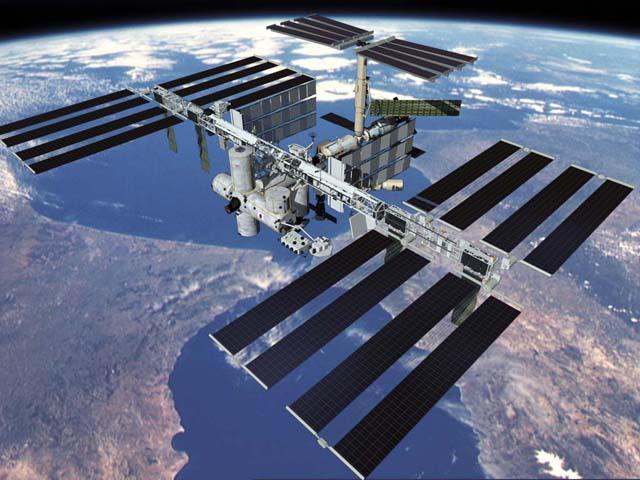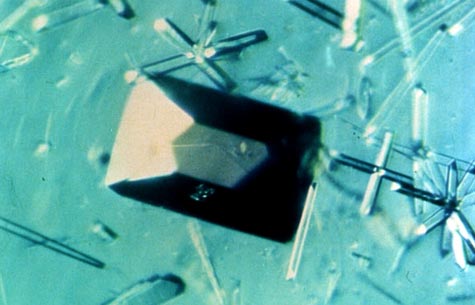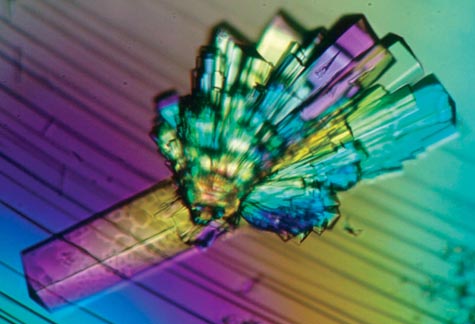 [Image: The International Space Station].
[Image: The International Space Station].
Wired reports that “a swaggering Texas investor” wants to turn the International Space Station into a kind of orbiting drug lab – growing hi-tech medicines in space.
After all, you can do “miraculous things” in microgravity:
Disease-causing proteins crystallize so well – growing larger and clearer – that finding a drug to stop the protein’s damaging activities could happen months, if not years, faster.
In which case, putting architecture into space might have inadvertantly helped catalyze a cure for cancer.
 [Image: A protein crystal – a kind of micro-ziggurat].
[Image: A protein crystal – a kind of micro-ziggurat].
While it seems next to impossible to believe that we’ll be able to maintain flights back and forth between Earth and the ISS in a post-oil economy, it is nonetheless quite fascinating to think that, someday, depressed teenagers in suburban Arizona might pop space-made anti-depressants, affecting hormonal moods through the use of literally extra-terrestrial substances; or musicians in small apartments in Prague might swallow attention deficit drugs crystallized in microgravity, writing the world’s most intricate symphonies in response; or perhaps even illegal new hallucinogens will be developed in windowless, symmetrical rooms hovering 250 miles above the Earth’s surface, and they’ll be taken by Rem Koolhaas-reading students at SCI-Arc who then draw up plans for self-healing tentacular cities, under the influence of space…
 [Image: Another protein crystal].
[Image: Another protein crystal].
Either way, imagine that as your summer job! No longer connected to the surface of the Earth, wearing a hermetically sealed white suit, growing proteins.
Read more @ Wired.
The space shuttle uses liquid oxygen and hydrogen, why couldn’t we maintain the flights in a post-oil economy?
Because of everything else associated with the technical apparatus of space exploration, from the grease that keeps the transport/crawler working (as it hauls the shuttle out to the launch pad) to the petrochemicals that go into synthesizing materials that keep our machines, circuitry, plastics, etc. etc. functional. The space shuttle might have fuel, but everything else will gradually fall apart.
Or we’ll find an oil substitute and be fine, in which there’s only climate change to worry about.
Time to build the space elevator!
gives new meaning to the phrase “getting high” to be sure…
b
It said: but everything else will gradually fall apart.
Statements like that make me shake and feel like I want to vomit. I grew up reading Clarke, Heinlein, Asimov and Pournelle, and I watched movies like “Young Thomas Edison”, and “Madame Curie” and “The Story of Louis Pasteur”. Clever people transformed the world from what we knew it to be in the 1800s (shit and disease everywhere, hardly any machines, everything done by people or animal power) into the modern world of today. Can you picture how crazy someone would have been in the early 1800s to imagine our modern world of today? It’s a very small leap to imagine that there would not be substitutes for petroleum products in the future. Indeed with cheap enough energy from breeder reactors, you could have chemical plants cook up some petroleum artificially.
Well, then I suggest that you vomit, because I’m not going to take that statement back.